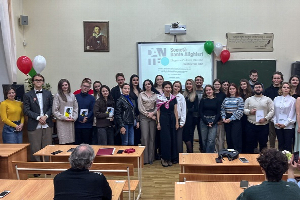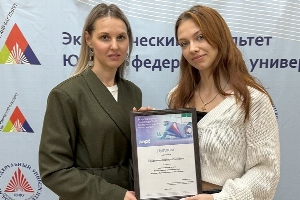
Southern Federal University has won the second prize in the prestigious BRICS Industrial Innovation Competition
The Southern Federal University took part in the BRICS Industrial Innovation Competition. The joint team of NITC "Neurotechnology" and the Research Institute of Robotics and Control Processes of the Southern Federal University submitted an application in the direction of "Low–altitude industry - General Aviation" and won the second prize with the project "Biohybrid system for humanitarian demining".

The competition aroused great interest among the BRICS member countries: Russia, Brazil, India, China, South Africa. A total of 1,357 applications were submitted, in the direction of "Low–altitude industry – General aviation" - 184 applications. One first place was awarded in each of the directions, two second, three third and 34 places were to be awarded as outstanding projects. The Organizing Committee was represented by employees of industrial enterprises, ministries, and academic structures from all BRICS countries.
The "Biohybrid system for humanitarian demining" was implemented at the junction of the results of two federal projects: Advanced Engineering Schools and Priority 2030 (national project "Science and Universities"), in which the SFedU participates.

The team of the Southern Federal University included V.N. Kira (head of the group) and P.O. Kosenko from the NITC "Neurotechnology", M.Y. Medvedev (head of the group), E.Y. Kosenko, A.V. Leshchev–Romanenko, Ya.V. Kabachevsky, M.I. Vorotnikov, N.S. Chernyshev from the RiPU Research Institute. The project manager is the director of the Research Institute of Robotics and Control Processes V.H. Pshikhopov.
The SFedU project is aimed at creating a mobile autonomous biohybrid system for humanitarian demining using UAVs and the unique capabilities of macroscopic animals, which should be able to perform tasks offline, which greatly simplifies the implementation of search operations in practice and makes them safer.
"We tried to use two of our great achievements in the project: from the RiPU Research Institute — an intelligent unmanned aerial vehicle that can fly at low altitudes in obstacle conditions, and at the same time it is a carrier of a macroscopic animal, namely, a rat. This part of the project is related to the development of NITC "Neurotechnology". We have made a container for placing a rat on board a UAV, prepared the drone itself, equipment for pumping air to a rat as an element of a biohybrid sensor system capable of detecting explosive vapors," said Vyacheslav Pshikhopov, director of the RiPU Research Institute, project manager.

The essence of the proposed innovative approach to creating a UAV is to increase the autonomy of its operation (with the possibility of group use) with a low sensory and computational load on board. This is achieved by increasing the level of intellectualization of algorithms and technologies for control, navigation and communication.
The autonomy of the system will be provided by local and global navigation systems, an obstacle avoidance system, an accurate landing system, on-board computers, as well as algorithmic and software control systems, technical vision and obstacle avoidance (stationary and dynamic).
"A macroscopic animal (rat) located in a special container on board a UAV should be able to accurately identify objects of interest (explosive substances), signaling this. To do this, microelectrode matrices are implanted into the structures of the olfactory brain of a trained animal, which makes it possible to detect pairs of explosive substances both by the behavioral reactions of the animal and the activity of its brain," said Valery Kira, chief researcher at NITC Neurotechnology.

The further plans of the scientists of the Southern Federal University are to bring the project to the demonstrator and submit it before the end of the calendar year. The Foundation for Advanced Studies has already shown interest in it.
"The only difficulty at the moment is to calculate how the rat will feel on board; how much the training it will be subjected to will be shaped by stressful conditions for it.
The topic is very interesting and promising. But the most important thing is that biologists, teaming up with technicians, presented a new quality product that is highly appreciated by the community of independent experts," Vyacheslav Pshikhopov added.

The project of SFedU scientists will help with the search for mines not only in the areas of a special military operation, but also in the Syrian Republic, countries of the Middle East and Africa.
Краткая ссылка на новость sfedu.ru/news/76240




